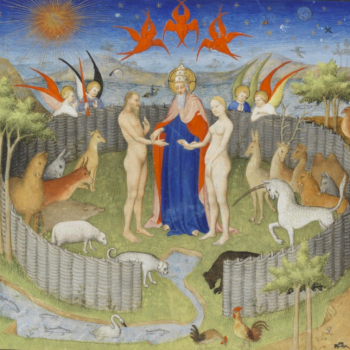
In many religious debates, the word Gnostic is often thrown around as a way to insult one’s opponent, with the intention of suggesting they are a heretic. The problem is that the term is often used wrongly. While it does not necessarily indicate someone is a heretic, there are various heretical groups, each which claimed special knowledge necessary for salvation, that were labelled Gnostic so that the term became associated with heresy. While the claim that particular knowledge is necessary for salvation is certainly a problem,[1]
The notion that some people could receive special insight was not in itself rejected, indeed, many of the early Christians who opposed various heretical Gnostic sects declared that the true Gnosticism was to be found in the Christian faith. This is because those who live a life of holy devotion to God might find themselves experiencing God in a transcendent fashion and are worthily called Gnostics and have been honored because of the grace God gave to them[2] It is for this reason that being a Gnostic is not in and of itself a problem: all those who have special insight either through mystical communion with God or through careful study of Scripture and holy tradition can be called Gnostics; the problem which must be avoided is false claims to such knowledge with teachings that run contrary to the truth.
Christianity must not be an anti-intellectual religion. Those who employ the term Gnostic disparagingly to theological or even political opponents because their opponents have greater insight, greater realization of the truth, do the Christian faith a great disservice. We are called to worship God with all our mind, heart, and soul; for some, but not all, that will lead to several intellectual and scholarly activities which can then be used to help the faithful. To disparage them for their accomplishments is only going to cause scandal as non-Christians will consider Christianity as being anti-erudite. Christianity has room for Gnostics as well as those who are not called to such a vocation; but what it does not have room for is the declaration of serious error.
Christianity affirms the Gnostic endeavor to pursue and know the truth. In that pursuit, some will have more opportunity, more ability to study and come to know more of it than others; there is nothing wrong when those who truly have attained some great insight should speak with authority because of that knowledge. They could be called a true Gnostic if the knowledge and wisdom which they impart is true, and following various ancient Christian writers, that would be considered the kind of honor which Christians should recognize as a great accomplishment.
This is not to say all who are called Gnostics, all who portray themselves as having insight, should be respected. There is a reason why the term Gnostic became associated with heretics and that is because in first few centuries of Christian history, many groups claimed Gnostic knowledge which had to be rejected. Not only did they falsely claim knowledge which they did not possess, they were prideful in their error, making it difficult if not impossible for them and their followers to be corrected. They were not persuaded by reason because they claimed supernatural revelation which raised them above the common crowd, indeed, above any criticism, even though what they taught was philosophically and theologically faulty. This kind of Gnostic is the kind which no Christian should desire to be.
While there were many different so-called Gnostic groups with their own cosmological myths and soteriological understanding, each riddled with errors, there were several features which they held in common. To properly impugn someone as being a heretical Gnostic, they should be shown to follow the basic principles which the so-called Gnostics had in common. If they do not, then if the term is being used to denounce someone else, it being used erroneously and should be treated as worthless.
Four particular features are important in determining if someone follows heretical Gnosticism.
The first feature, and indeed a primary one, is to hold to some form of ontological dualism. There is a good God, but also a fallen (either mistaken or evil) creator God who established material creation.
The second feature follows from the first. The good God is spirit, and from him emanates spiritual entities which are said to have been trapped in matter by the evil (or at least ignorant) God. Matter is an evil prison, and salvation is understood as the return of the good spiritual principle to the good God outside of creation. Gnostics, believing this, seek salvation by freeing themselves from the temptations and confines of materiality (there are various forms of this, some represented by sects following rigoristic asceticism, with others following the exact opposite position, becoming anti-nomian in their inclinations). Because of this, they did not believe God truly became man; he came to us in the form of a man, but it was an illusion as the body itself was illusory. God did not did not die on the cross to save material creation; he only came to us to reveal the problem of our existence and to lead us away from our materiality. Material creation will not to be saved; only good spirits who are to be led out of material bondage and return to their origin with the good God will be saved.
Third, there is a rejection of the Old Testament as well as much of the New Testament. They believed that the God who presented himself in the Old Testament is the Demiurge, the fallen creator, who is selfish, ignorant, and self-serving. His laws and commands are not to be followed. The New Testament represents the revelation of the true God through Jesus Christ. Instead of seeing the connection between the two testaments, they are made to oppose each other; those who were seen as bad in the Old Testament were often seen as heroes by the Gnostic groups.
Fourth, as a result of their superior knowledge, heretical Gnostics opposed normal ecclesial authorities. The apostles were said to have passed down secret esoteric teachings which only the Gnostics knew. At times, when it benefited them, the Gnostics would acknowledge the church as being a useful tool, aimed for the masses, while the Gnostic would then recruit from amidst the church those they believed spiritually ready for their own higher knowledge and the truth which the church could not know.
Heretical Gnosticism often infiltrated and confused various Christian communities and had to be slowly rooted out when their real teachings were made known. They denied the world and its good. As a result, contrary to Voegelin, they were not attempting to create utopia on the earth. They were not seeking to immanentize the eschaton but the reverse: to show that heaven and earth could never be united. It is therefore with great irony that many who have employed the term Gnostic to criticize their opponents are those who most resemble the heretical Gnostic sects of old.
Having superior knowledge does not make someone a heretical Gnostic. Critics who label someone Gnostic solely because they demonstrate some greater insight indicate that they have nothing but fallacious argumentation to defend their own position. They would rather use an ad hominem attack, disparaging the messenger, instead of demonstrating how and why they are in error. But, the problem is much worse, when the term is employed to attack those who stand in opposition to all heretical forms of Gnosticism. When this is done, the end result is the very Gnosticism which is supposedly being rejected.. This is exactly the problem which emerged with Voegelin and his followers. They have so warped the minds of their followers to decry social justice because they do not see any value in trying to improve—or save – the world, contrary to what the Christian tradition has always said.
[1] The Christian faith is in itself a form of Gnosticism because it does teach various doctrines and ideas which are not found in the same way outside the Christian faith. However, it does not treat such knowledge as salvific. Cooperation with grace is necessary for salvation; knowledge can help motivate us in our engagement with grace, but those who, through no fault of their own, are ignorant of various teachings of the Christian faith can still be saved by God’s grace (which, among other reasons, is why infants can be baptized, welcomed into the family of God, even though they do not have any particular knowledge of the Christian faith themselves).
[2] Both St. Clement of Alexandria and St. Maximos the Confessor employed the term “Gnostic” in such a fashion in their writings, showing that they did not think the term itself was unfitting Christian orthodoxy.
Stay in touch! Like A Little Bit of Nothing on Facebook

















